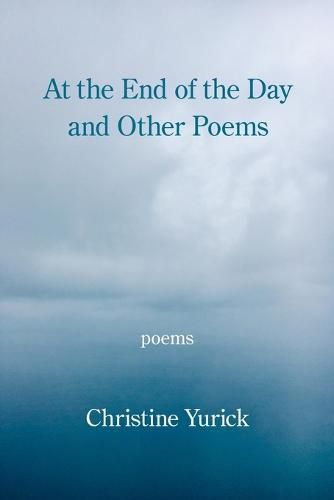Readings Newsletter
Become a Readings Member to make your shopping experience even easier.
Sign in or sign up for free!
You’re not far away from qualifying for FREE standard shipping within Australia
You’ve qualified for FREE standard shipping within Australia
The cart is loading…






At the End of the Day speaks deep emotions with a quiet resonance that a reader can't help but feel strongly. From the first poem, to the title poem, and finally to the last poem in the collection, the clear, accessible language opens up a door into a complicated and enduring reality. With hints of a Jack Gilbert-esque simplicity, where longing lives beneath quiet imagery, this poetry collection is the work of a mature and confident word-artist. This collection is a gathering of poems that asserts the right of an artist to choose "... stillness and truth and wild." -Christine Klocek-Lim Like the late poems of James Wright, Yurick's spare lyrics are besotted with Italy-its light, its groves, its intimacies. In her account, it is a place where the tourist may become the traveler and new love season into a timeless bond. As Yurick reminds us with grace and simplicity, at the end of the day, such idyls of love are what remain. -David Yezzi
"We are staying in that little apartment..." begins the speaker of Yurick's "Borgau," but Yurick knows they do not: don't stay, don't remain, briefly in residence above waves coming in and going out again. Even the usual consolation, art, cannot finally answer though it offers work in its way. And I celebrate this work, these poems hard and clear as sunlight bent back, sparkling off surfaces that do not yield. -Kate Northrop
A poet in love, Yurick is compelled to write poems equal to the poem she is living. They need to do more than express the experience of being in love, which feels fraught with the possibility of losing oneself; they need to help her re-connect with her sense of who she is. Returning to her self-if only as subject of the poem-she places her various self-portraits throughout this collection like white pebbles left along the path, allowing for the illusion that she might find her way back. Slowly she arrives at the realization that "one can never step into the same person twice." -Alfred Nicol
$9.00 standard shipping within Australia
FREE standard shipping within Australia for orders over $100.00
Express & International shipping calculated at checkout
At the End of the Day speaks deep emotions with a quiet resonance that a reader can't help but feel strongly. From the first poem, to the title poem, and finally to the last poem in the collection, the clear, accessible language opens up a door into a complicated and enduring reality. With hints of a Jack Gilbert-esque simplicity, where longing lives beneath quiet imagery, this poetry collection is the work of a mature and confident word-artist. This collection is a gathering of poems that asserts the right of an artist to choose "... stillness and truth and wild." -Christine Klocek-Lim Like the late poems of James Wright, Yurick's spare lyrics are besotted with Italy-its light, its groves, its intimacies. In her account, it is a place where the tourist may become the traveler and new love season into a timeless bond. As Yurick reminds us with grace and simplicity, at the end of the day, such idyls of love are what remain. -David Yezzi
"We are staying in that little apartment..." begins the speaker of Yurick's "Borgau," but Yurick knows they do not: don't stay, don't remain, briefly in residence above waves coming in and going out again. Even the usual consolation, art, cannot finally answer though it offers work in its way. And I celebrate this work, these poems hard and clear as sunlight bent back, sparkling off surfaces that do not yield. -Kate Northrop
A poet in love, Yurick is compelled to write poems equal to the poem she is living. They need to do more than express the experience of being in love, which feels fraught with the possibility of losing oneself; they need to help her re-connect with her sense of who she is. Returning to her self-if only as subject of the poem-she places her various self-portraits throughout this collection like white pebbles left along the path, allowing for the illusion that she might find her way back. Slowly she arrives at the realization that "one can never step into the same person twice." -Alfred Nicol